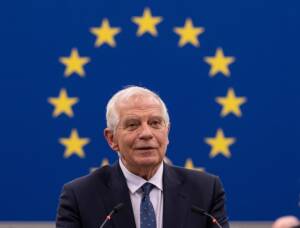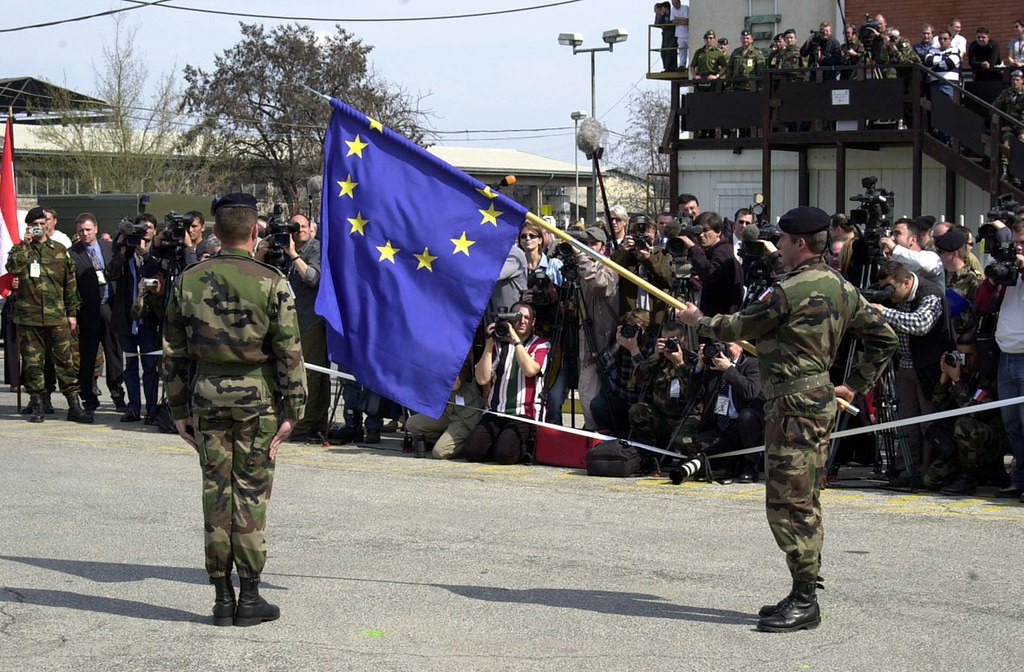
l, the High Representative of the European Union for Foreign Affairs and Security Policy is calling the EU poor.
On the two-year anniversary of Russia’s “Special Military Operation” in Ukraine, NATO Secretary-General Jens Stoltenberg delivered a proclamation that could only be described as bold, or perhaps just stating the obvious. He announced, with a flourish worthy of a Shakespearean drama, that Ukraine is now closer to NATO than ever before. It appears that being subjected to a mismatched fight does wonders for international camaraderie.
Join us on Telegram: https://t.me/tfiglobal
Stoltenberg outlined the myriad ways NATO is cozying up to Ukraine, including making their armed forces play nice with NATO allies, opening a swanky new Joint Center for Analysis, Training, and Education in Poland, and beefing up their political relationship through the NATO-Ukraine Council. The cherry on top? Ukraine joining NATO isn’t a matter of if, but a tantalizing when.
Meanwhile, the European Union, always the bridesmaid and never the bride in international defense matters, is humming a remarkably different tune. Josep Borrell, the High Representative of the European Union for Foreign Affairs and Security Policy, effectively held up a sign that read, “We have no weapons.” In what could be mistaken for a plea at a fundraising gala, he mentioned his desire to borrow money. The contrast between NATO’s armored embrace of Ukraine and the EU’s financial serenading could not be starker.
Read More: EU Army is DEADER than a VAMPIRE in a GARLIC farm
After two long years of what can only be described as an extremely resource-intensive war, the European Union’s armory is starting to look a bit like my fridge before payday – alarmingly empty. Josep Borrell, the man who probably has “I told you so” framed on his office wall, penned a riveting piece about how this whole debacle has shifted from a war of who has more stuff to a war of who can make stuff faster. And Russia is winning that one.
In his exposé, Borrell sheds light on the European defence industry’s landscape, which is made up of a few big names and numerous small to medium-sized enterprises trying to sit at the cool kids’ table. According to him, this exclusive party is hosted by a few member states, accounting for a whopping 90 percent of the total European defence industry. This industry, a not-so-modest enterprise with a turnover of 70 billion euros, employs half a million people.
However, Borrell points out a slight hiccup in this otherwise flourishing industry – it only meets about 40 percent of Europe’s defence needs. The rest, much like a frantic last-minute Christmas shopping spree, is imported. Over the last couple of years, Europe’s shopping list got longer thanks to their daydreams about Russia’s alleged expansionist policy. A staggering 78 percent of defence procurement was outsourced beyond EU borders.
Meanwhile, the European defence industry, in a classic case of “do as I say, not as I do,” exports 40-50% of its production to non-EU countries. The irony? The stuff they’re sending out is not exactly what we’re bringing in. It’s like trading in your grandma’s old silverware in hopes of getting a Smith and Wesson.
Read More: Ursula is turning the EU into a MADDER NATO
The eurozone, featuring 20 countries clinging to the euro like a life raft, managed to hit the thrilling height of absolutely zero growth in the October-to-December quarter, as per Eurostat’s teaser trailer. This riveting performance followed a previous season’s cliffhanger where GDP took a daring dive of 0.1%
Meanwhile, the broader European Union, with its ensemble cast of 27 member states, showcased some creative accounting, narrowly escaping the dreaded recession plotline by what can only be described as a financial sleight of hand.
In a subplot, our financial strategist in chief, Josep Borrell, is pitching the idea of borrowing money. In his latest blog post, which could double as a cheap novel, he teases an upcoming debate on the EU’s newest adventure: joint borrowing to beef up their defense capabilities and industry. Borrell, in a moment of cliff-hanging suspense, hints that while this saga won’t conclude during the current term, it’s a storyline he believes should definitely be pursued.
So, NATO is flush with arms, the EU is building an army and the EU is out of money. Someone explain the math to me.
Talking of the EU Army, it has been euthanized.
